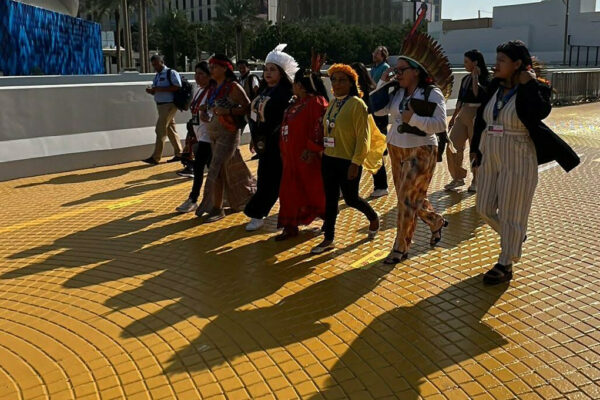Peru’s Vice-Ministry of Inter-Culturality (VMI) is officially supporting proposals to establish five reserves for indigenous peoples living in “voluntary isolation” in the Amazon rainforest totaling almost four million hectares.
The VMI’s support does not mean that the reserves will definitely be established, but they will now be discussed by a cross-sector government commission which is scheduled to convene with indigenous leaders in Peru’s capital, Lima, on 26 and 27 August.
The VMI, the government entity responsible for indigenous peoples and situated within the Ministry of Culture, revealed its support for the reserves in a letter to national indigenous organization AIDESEP. According to AIDESEP’s Isrrail Aquise Lizarbe, an anthropologist:
The favourable position adopted by the VMI regarding the proposed reserves is a very important step in protecting the rights of indigenous peoples in isolation and initial contact, which AIDESEP has been working on for 15 years. We understand that this decision is based on fieldwork by specialists in indigenous peoples in initial contact and voluntary isolation from INDEPA [a government agency situated within the VMI] verifying the evidence in anthropological reports previously prepared by AIDESEP.
However, four of the five proposed reserves are currently overlapped to some degree by hydrocarbon concessions where various companies are at different stages of exploration or production, according to a government map dated November 2012.
Indeed, one of the proposed reserves, between the Napo and Tigre rivers in the Loreto department in northern Peru, is almost entirely overlapped by four concessions where one of the companies, Perenco, claims there is “no evidence” that the “isolated” people exist.
Another of the companies operating in this region, Repsol, acknowledged the “isolated” people exist in 2003, but has backtracked in recent years and made different statements claiming their existence is “possible” or that the company itself has never found any evidence.
Both Perenco and Repsol make these claims despite considerable proof of the “isolated” people collected over the years, and Peruvian and international opposition to their operations including lawsuits and appeals to the UN and the Inter-American Commission on Human Rights.
The reserve in this region, adjacent to the border with Ecuador, was proposed 10 years ago by ORAI, an indigenous organization affiliated to AIDESEP and based in the largest town in Loreto, Iquitos. According to David Freitas Alvarado, from ORPIO, ORAI’s successor organization:
A group of professionals from the Vice-Ministry visited last year and, together with ORPIO leaders and support staff, went to the region and discovered that there was sufficient evidence for the existence of indigenous people living in isolation. They have bravely continued to maintain that position in many ways, one of which is by giving their favourable opinion on the proposed reserve.
Perenco’s concession, Lot 67, is in the heart of the proposed reserve and Repsol’s, Lot 39, stretches across a huge swathe of it and is estimated by Peru’s Energy Ministry to contain the largest “probable” oil deposits in the country.
Asked by The Guardian if, given the VMI’s support for the proposed reserves, the companies would continue to operate in the region and maintain their positions regarding the “isolated” people, both Perenco and Repsol declined to respond.
Another of the proposed reserves, in the Yavari-Tapiche region adjacent to the border with Brazil, is overlapped by three concessions: Lot 95, held by Gran Tierra Energy, and Lot 135 and Lot 137, both held by Pacific Rubiales Energy.
According to NGO Survival International, Pacific Rubiales began its search for oil in Lot 135 in December last year and, according to AIDESEP, the company is opposed by many Matsés people who consider the region their territory and support the proposed reserve.
“Tell the world that the Matsés are firm in our position against the oil company. We do not want it on our land,” said Matsés man Salomon Dunu in a video message to Pacific Rubiales posted on the internet in June by Survival.
Pacific Rubiales’ response is to acknowledge the “isolated” people exist but claim that Lot 135 “has no presence of Matsés population”, the company “has not ever entered Matsés territory”, and it “is not performing exploration activities whatsoever in their area.” Says spokesperson Carolina Azcuénaga:
[Our company] executes all its activities in compliance with the legal regulations, the preservation of the environment, but above all the protection of life as a fundamental right. The exploration of Block 135 will observe all the required measures to minimize the impact of its operations and all the necessary precautions to avoid any risk or danger for the indigenous people in “voluntary isolation.” We will respect and abide any disposition of the Peruvian authorities regarding the area of the Yavari-Tapiche Indigenous Reserve.
But Survival’s Rebecca Spooner says that Pacific Rubiales has its “head in the sand”, that “no contingency plan can assure contact doesn’t occur”, and that it is “widely known that any contact is likely to result in the rapid spread of deadly diseases.” Says Spooner:
Their claim there’s “no presence” of the Matses in Lot 135 is completely untrue. Not only do they use the area for hunting but it’s also the source of the main rivers on which they rely for every basic need. The uncontacted Indians are likely to be Matsés too, according to INDEPA. The VMI’s response to the proposed reserves is extremely encouraging, but if they’re to mean something in practice then companies like Pacific Rubiales and Perenco must be barred.
However, since the VMI wrote to AIDESEP, on 10 July, the Minister of Culture, the Vice-Minister of Inter-Culturality and the head of the VMI department, the DGDPI, which authored the letter have all left their posts.
“In light of the latest changes at the Culture Ministry we think it appropriate to know what position the new Minister, Diana Alvarez, will adopt and whether the agreement reached previously with the ex-Minister will be respected and continued,” AIDESEP stated on 25 July.
Five reserves for indigenous peoples in “voluntary isolation” have already been established. Although only one, the Kugapakori-Nahua-Nanti Reserve, is currently overlapped by a concession, they have all been repeatedly invaded by loggers and other people.













